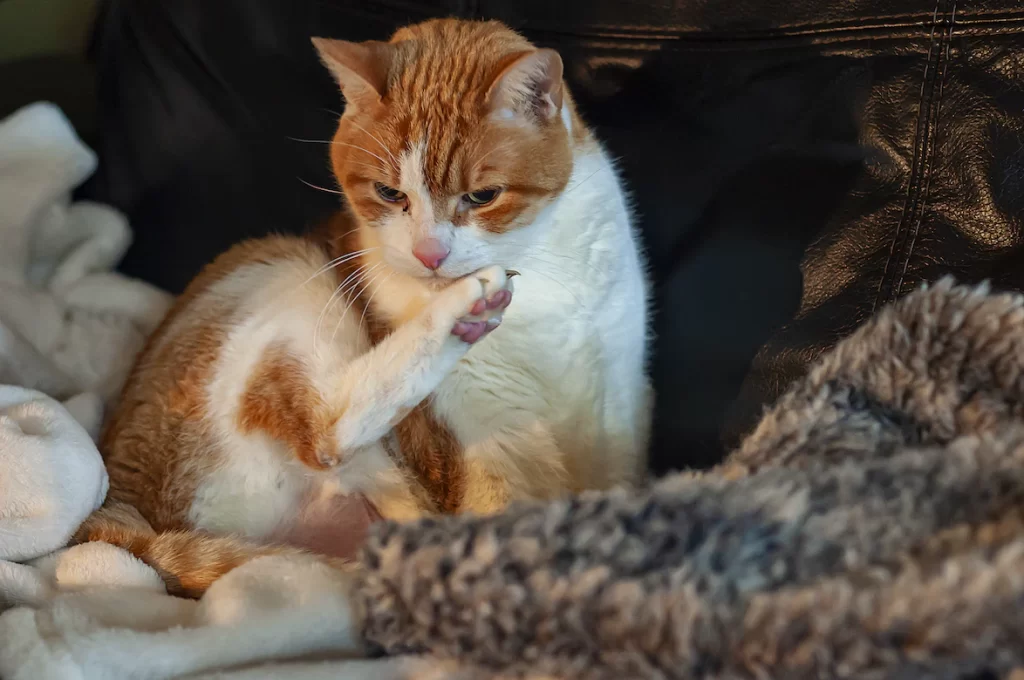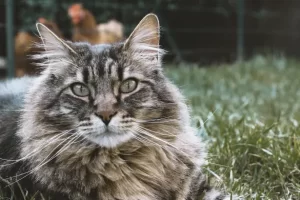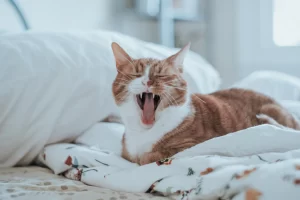Last updated on February 26th, 2023 at 12:54 am

Cats pull their hair out for a variety of reasons. In some cases, it’s a behavioral disorder called psychogenic alopecia, which is caused by stress or anxiety. This can happen when cats are exposed to changes in their environment, or when they feel threatened or insecure. Cats may also pull out their fur to groom themselves, as a sign of affection or to relieve an itchy skin condition. When cats pull out their fur due to stress or anxiety, it’s important to identify the source of the stress and address it as soon as possible. Cats may become stressed due to boredom, lack of interaction, or changes in the home. Providing cats with plenty of playtime, mental stimulation, and interaction can help reduce stress and prevent them from pulling their fur out.
Cats may also pull out their fur to groom themselves. It’s a common behavior among cats, and it’s important to ensure that they have plenty of grooming opportunities throughout the day. This can include brushing, combing, and even providing cats with special grooming tools to help them groom themselves.
It’s normal for cats to groom themselves, but there are times when it could be an indication that something is wrong with your cat’s health. If this is the case, you may be wondering why your cat is pulling out his fur. As a pet owner, you will be the first to notice if your cat’s grooming habits have changed for any of a number of reasons. However, should you be worried if you discover clumps of your cat’s hair around the house or if you see a few bald patches on your cat’s fur? Keep reading to find out.
OCD (Obsessive Compulsive Disorder) In Cats: Is it the Possible Reason?
Obsessive compulsive disorder (OCD) in cats is an often-overlooked condition that can be hard to identify and diagnose. It is not as well understood as it is in humans, and it is difficult to determine whether it is a genuine disorder in cats or simply part of their natural behavior. OCD in cats can be defined as a disorder characterized by repetitive behaviors that the cat performs without any apparent purpose or reward. The behavior is usually performed in response to certain triggers such as noises, smells, or other perceived threats. It usually takes the form of excessive grooming, pacing, or other repetitive behaviors. These behaviors can become quite extreme and can interfere with the cat’s day-to-day life.
Your cat can be displaying OCD symptoms, and one of them is that he or she keeps pulling out patches of hair. If your cat appears to be healthy overall, you may want to think about whether any recent changes in its surroundings could have caused the sudden development of this behavior.
How Will I Know if My Cat is Over-Grooming?
Most cat owners would never suspect that their feline buddy is washing more often than usual because cats are so discreet about their grooming habits. Psychogenic Alopecia, which results in bald spots on a cat’s body, is often the first sign of illness noticed by pet parents.
Also, you may see your cat bringing up fur balls or finding clumps of fur around where it has been sleeping and grooming. Both of these issues may indicate that your cat is shedding more than usual. Spending more time with your pet may cause you to observe changes in their grooming habits, such as increased time spent combing or even intentional hair loss.
What is Feline Psychogenic Alopecia?
Feline psychogenic alopecia is a type of self-induced hair loss in cats. It is a behavior-based disorder that causes the cat to pull out its own fur. This is a common problem in cats, especially those that are stressed or anxious. In some cases, cats may also groom excessively, leading to hair loss. The exact cause of feline psychogenic alopecia is unknown, but stress and anxiety are thought to be the primary triggers. Cats may respond to changes in their environment, such as a new pet in the house, a new home, or a new family member. They may also be stressed by changes in their routine, such as a new job or school schedule for their owner.
Symptoms of feline psychogenic alopecia include bald patches on the cat’s skin, redness and irritation, and excessive grooming. The bald patches may be itchy and the cat may lick or bite at them, leading to further hair loss.
The treatment for feline psychogenic alopecia revolves around reducing stress and anxiety in the cat. This may include environmental enrichment, such as providing a safe place for the cat to hide, introducing new toys and activities, or providing.
Stress That Leads to Excessive Grooming
Cats may pull their hair out for a variety of reasons, including underlying health issues. Overgrooming can sometimes be an indication that your cat is stressed. Cats are highly sensitive creatures who prefer routine and habit. Any alterations to that can throw them off balance, and one way they demonstrate this is by grooming excessively, resulting in psychogenic alopecia.
This syndrome can be caused by changes at home, such as the entrance of a new pet, the arrival of a baby, family members moving in or out, construction activity, moving house, or another cat causing them difficulty outside. Grooming is a typical stress response for cats because it stimulates the release of endorphins, which have a calming effect. If your cat has this ailment, you will most likely observe hair loss on the inside of the back legs, the abdomen, and the back.
It’s important to remember that psychogenic alopecia is a rare diagnosis, and in cases where it’s proven, there are many various ways to manage it, as well as techniques to help minimize stress and keep your cat quiet and happy. Your veterinarian will be able to advise you on this.
Medical Reasons Behind Cat’s Pulling Hair Out Behavior
If your cats pull their hair out, it could be an indication of disease or another condition. While itchiness is a typical cause of excessive licking and hair pulling in cats, there are other factors to consider.
Germs Such as Mites and Lice
Other parasites may cause your pet to scratch so much that they lose hair as a result of the irritation. If your pet has ear mites, demodex, or scabies, they may scratch excessively.
Flea Bites Produce Itchy Skin Reactions
Itchiness in cats is frequently caused by fleas, which can be taken up by an indoor-only cat. Fleas are notoriously difficult to eradicate. For at least three months, and thereafter monthly, your cat should be treated with an effective flea medicine. You will also need to treat your home to break the cycle of these little pests.
Some fleas’ saliva can trigger allergic reactions in cats. Flea bites can cause a red, itchy rash on your cat’s skin, usually in the crotch area. Because cats groom themselves by scratching and biting, bald patches may develop.
Also read: Natural Ways To Get Rid Of Fleas On Cats
Allergies
When your cats pull their hair out, it could be due to allergies that lead to itchy skin. Allergies can occur at any time during their lives. Some foods, garden plants, and even home things might cause allergic reactions. Itching and hair loss are the most common symptoms of cat allergies, but their severity varies.
Pain
Our pets are unable to communicate with us when they are in discomfort. Because cats are so stoic, even minor discomfort might be difficult to detect in them. Excessive licking or hair loss on a specific area of your cat’s body, such as a joint, may suggest pain. This is frequently caused by arthritis.
Ringworm
Despite its apparent association with insects, ringworm is caused by fungi. Although many felines do not suffer itching, your pet’s skin may develop small, circular patches of hair loss that are also red and inflamed. Ringworm must be diagnosed and treated as soon as possible since it can readily spread to humans and other domestic pets.
Problems With Their Anal Glands
Have you heard that cats have anal glands as well? Your cats may lick its posterior region excessively and pull out their hair around this area if it has an infection or impaction in the anal glands. The condition can be solved by either expressing the anal glands or using antibiotics.
Skin Diseases
Itching and soreness are common signs of feline skin illnesses. Itchy cats frequently lick and chew at the affected area for relief, which can aggravate the disease.
Bladder Problems (Unlikely But Possible)
The tearing off of fur in the vaginal regions or stomach area is a symptom of illness, but a highly improbable one. It is common for cats to get urinary tract infections, which can sometimes result in excessive grooming. If you notice that your cats frequently lick and pull their hair out at the area around their genitalia, you should investigate.
There is a potential that areas of baldness or sparse fur are caused by an illness. However, you would also notice additional signs, like as frequent excursions to the litter box. After eliminating all other probable causes, it is important to schedule an appointment with a veterinarian. With the right combination of drugs, any ailment may be healed rapidly.
What Should I Do if I Notice my Cat Pulling his Own Hair?
If you notice your cat pulling their own hair, it is important to take them to the vet as soon as possible. This is because cats may be suffering from a condition known as psychogenic alopecia, a psychological disorder that causes cats to pull out their own fur. This condition can be caused by stress, anxiety, or boredom, and it can cause significant hair loss and skin irritation. At the vet, they can determine if your cat is suffering from psychogenic alopecia by performing a thorough physical exam and by taking a skin sample if necessary. Once the diagnosis is confirmed, your vet can recommend treatment options depending on the severity of the symptoms.
Treatment may involve providing your cat with a calm environment that is free from stressful stimuli. Additionally, your vet may recommend a special diet and supplements, as well as behavior modification therapy. If your cat is still pulling their hair, your vet may prescribe medication to help reduce the anxiety and stress that is causing the behavior. Finally, it is important to be patient and understanding with your cat. Cats can be sensitive to changes in their environment, so it is important to keep their routine as consistent as possible.
What can I do to keep my cat from pulling his hair out?
There are a variety of things you can do to help keep your cat from pulling his hair out. First, take him to the vet to rule out any medical causes. Health problems such as fleas, mites, allergies, skin infections, and other skin diseases can all cause your cat to pull out his hair. If there is an underlying medical condition causing the problem, the vet can diagnose and treat it. Second, provide your cat with a stress-free environment. Make sure your cat has plenty of places to hide and sleep in peace and provide plenty of toys to keep him occupied. If he seems to be overly anxious, try using a pheromone diffuser in your home to relax him. Make sure your cat gets enough exercise. If your cat is bored or has too much excess energy, he may pull out his own hair to help relieve the stress. Try playing with him regularly and providing toys to keep him entertained.
Conclusion
There’s no need to fear if your cats pull their hair out as it is most likely the result of a simple underlying problem that can be simply treated in a veterinary facility. It is usually caused by stress or allergies. Excessive grooming in a cat can result in bald spots and areas of hair loss. In such cases, veterinary assistance should be sought in order to identify and treat the underlying cause of grooming compulsiveness called alopecia.
We’ve also discussed the medical reasons behind this behavior. The majority of causes of cats tearing off their fur are minor. However, if your cat continues to overgroom and bite her skin, you should take her to the nearest veterinary clinic. Your veterinarian will also be able to advise you on how to care for your cat’s coat in order to keep it healthy and shiny.


